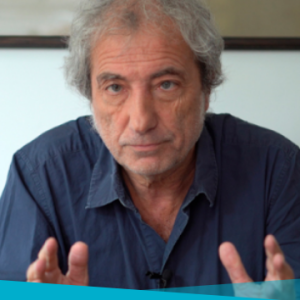
2 days ago
Adam Phillips - Helping and being helped: fear and desire
Helping and being helped informs almost all our forms of relating to other people.
About Adam Philips
"I was trained as a child psychotherapist and I worked in the NHS for 17 years. I am currently a psychoanalyst and a writer. Since 2003 I have been the general editor of the new Penguin Modern Classics translations of Sigmund Freud.
I write one day a week and I tend to write about psychoanalytic topics. I don’t ever write about my patients, though, but mostly on topics like boredom, kissing, hatred, obstacles and a whole range of things that interest me on a personal level. These are essays in the literal sense, since they are experiments for pursuing certain kinds of ideas."
Key Points
• We’re always equally dependent throughout our lives, but in different ways.
• Every time I ask somebody for something I’m acknowledging a lack of self-sufficiency, and that means having to face the fact that I need somebody who I can’t control.
• Real help is based fundamentally on care for another person, a capacity to make realistic promises and an ability to bear somebody else’s suffering
• One of the fundamental questions that helping and being helped raises is, what is power? And how is power going to be used?
Describing a life in terms of dependence
When I worked as a child psychotherapist in the Department of Child Psychiatry at Charing Cross Hospital in London, we developed a new method for interviewing new patients. Normally, in a medical context, you take a medical history when you meet the patient for the first time. In addition to that, we asked people to tell us the story of their relationship to help. In a way, it seems like a simple thing. It’s clear that we’ve spent our whole lives being helped in different ways, and yet we often don’t think about our relationship to the wish to be helped, the need to be helped and our capacity to bear being helped.
One of the striking things is that in order to be helped, you have to acknowledge there’s something you can’t do for yourself and there’s something you need somebody else for. These are two powerful and fundamentally formative experiences, because one of the ways of describing a life right from the beginning is in terms of dependence – that a baby is absolutely dependent on their family. And so you can think of a life as one in which one grows from a state of absolute dependence to relative independence.
The story we’re told officially is that we begin by being absolutely dependent. Then we have a long period in which we become more and more independent and then, when we’re old, we become dependent again. I think it’s probably truer to say that we’re always equally dependent throughout our lives, but in different ways. What dependence means is being able to acknowledge that I need other people in order to grow and develop. I can only live my life in a state of need and want. And what that means is something to do with what we call as adults “being helped”.
research explained, academic insights, expert voices, university knowledge, public scholarship, critical thinking, world events explained, humanities decoded, social issues explored, science for citizens, open access education, informed debates, big ideas, how the world works, deep dives, scholarly storytelling, learn something new, global challenges, trusted knowledge, EXPeditions platform
No comments yet. Be the first to say something!